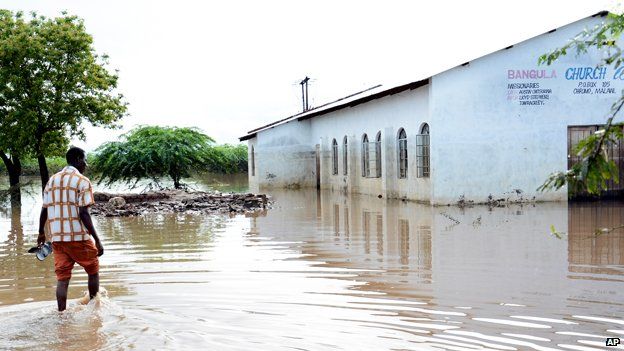Still thirsty after Malawi's flood
- Published

Recent floods in Malawi have left hundreds dead, many more homeless and devastated crops. Rosie Blunt visited two of the worst-affected areas.
It has been more than a week since Cyclone Bansi hit Malawi, but looking out on what was once a bustling marketplace beside the Phaloni River, the formidable rains and mauling winds could have struck yesterday. Brown water laps at the windows of battered shops. The stench of sewage is pungent in the heat. Several people are paddling around in boats, hoping to reclaim some belongings. This seems futile, but they are desperate.
When I left Malawi for a holiday in mid-December, the plane took off over a rusty, parched landscape. Three weeks later, I returned to verdant, fertile scenery. The rains had arrived.
After a month-long drought, rain was of course a blessing and a relief. Before, we would go for days without water in the taps. Boreholes were getting frighteningly low. There were fears that crops would shrivel and die.
Then those exquisitely refreshing, warm showers arrived, interspersed with flashes of hot, steamy sun that dried up the puddles. The best of both worlds.
Suddenly, torrential, ruthless, violent rain took over. Through the night it hammered on the roof like a tantrum. The raindrops felt like knives on our skin. Paths and roads rushed with water. It did not stop for three days.
The second night brought the winds. Roofs were ripped off and trees blown over. Electricity pylons were torn down and bare wires lay threateningly in the water.
Since then, hundreds of people have been killed or are missing, and hundreds of thousands have been left homeless.
Floods don't just kill people by drowning them. They kill people by destroying crops, which means famine. They kill people by spreading disease. They kill people by washing away homes, possessions and livelihoods, leaving nothing to survive on.
This is not just a disaster that will last a few days or weeks until the ground dries up. For many, it will last for years.
The other day, I visited Phalombe, a southern district and one of the worst affected. More than 20,000 houses were destroyed, each containing an average of five people, and some areas were submerged beneath 2.5m of water.
As the floods have churned up the already rutted dirt roads, I am shown around the region on the back of a rickety motorbike. It's a long and bumpy ride.
At the first village, Chimombo, the chief points to his neck when I ask how high the water was. As far as the eye can see, the land is pure mud, with pathetic sprouts of green revealing the ruined crops. Mounds of wood and bricks sit amid the sludge: the remnants of houses.
Most of the people who lived here are now at Miwemba Relief Camp, which has so far registered more than 2,000 people. Fortunately, Unicef has donated three huge tents and there is a functioning borehole nearby.
The displaced sit in the shade of trees. When I wave and say hello, they are friendly and respond to my limited Chichewa enthusiastically. At first glance you wouldn't think that these families and individuals have lost everything they own - shelter, food, animals and all their money, as people in villages rarely have bank accounts.
But they are simply concealing their despair. How can you start again with absolutely nothing? I ask one man, a farmer, who simply says, "I am waiting for somebody to help us."
The second relief camp, which accommodates those who lived in the villages beside the Phaloni River, is much worse off than Miwemba. There are no tents, no boreholes and very limited food. Three buildings house 713 people, including 193 children aged under five - the majority have to sleep outside, despite the rain. The misery is far more palpable here. People sit slumped in the hot sun appearing lifeless and hopeless. Children are malnourished and sluggish.
Malawi
- Population: 15.9 million (UN, 2012)
- Capital: Lilongwe
- Area: 118,484 sq km (45,747 sq miles)
"No water, no shelter, mosquitoes are biting!" one old lady declares, at which the others muster a laugh. At least they can see the funny side, but malaria is rife and sleeping outside increases the risks dramatically.
Cholera is another very real fear, which Mandinda Zungu, Programs Coordinator for Catholic Development Commission in Malawi, describes as a ticking time bomb. "Because pipes are blocked or destroyed, clean water supplies are cut off," she explains. "People are bathing in streams then drinking the same water further down. They are going to the toilet in fields, which, when it rains, spreads into the rivers. Few boreholes are functioning; those that are could be contaminated."
This is the cruelty of the floods - water, water everywhere but not a drop to drink. The rain we had hoped and prayed for brings only devastation.
How to listen to From Our Own Correspondent:
BBC Radio 4: Saturdays at 11:30 and Thursdays at 11:02 GMT
BBC World Service: At weekends - see World Service programme schedule.
Subscribe to the BBC News Magazine's email newsletter to get articles sent to your inbox.